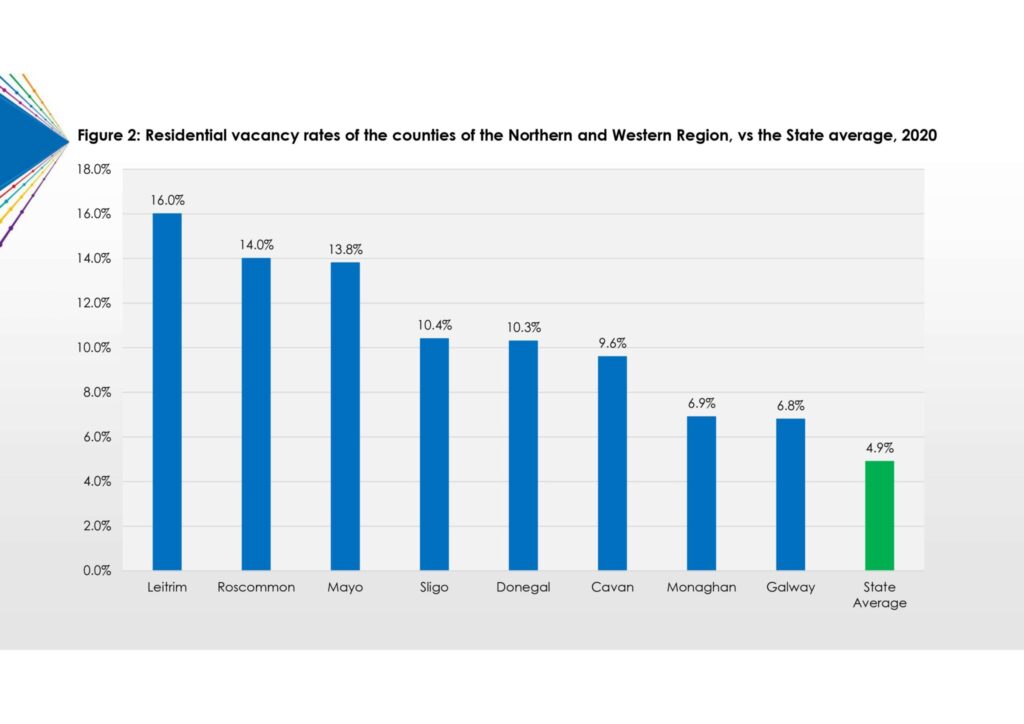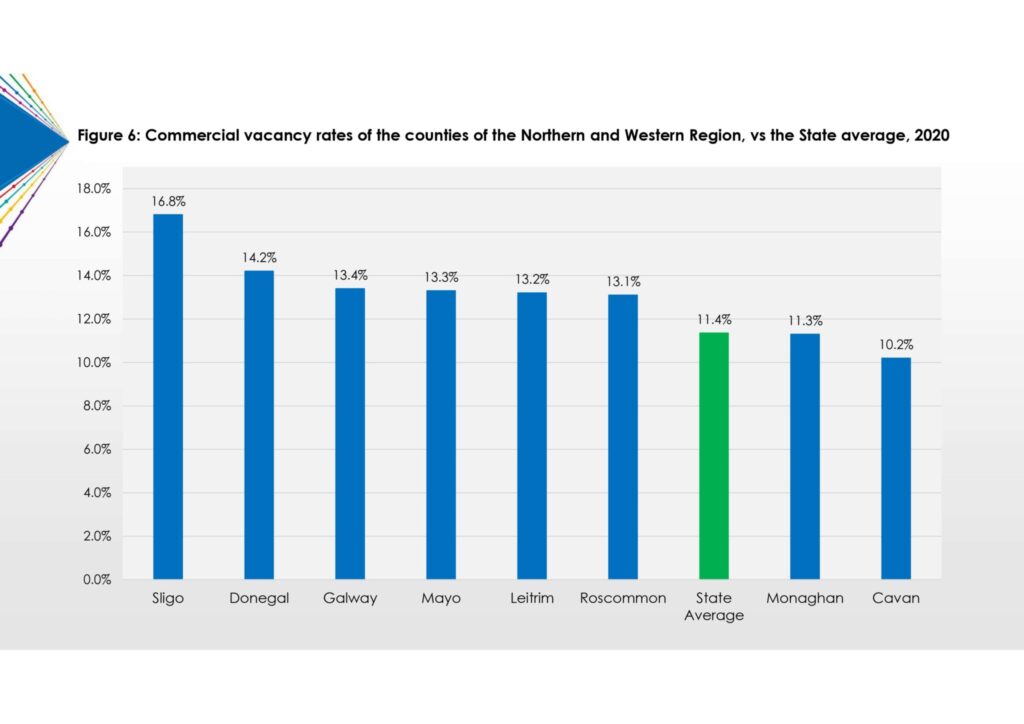The Northern and Western Regional Assembly (NWRA) is one of three Regional Assemblies in Ireland. They work with key stakeholders at EU, National, Regional and Local level to accelerate and optimise effective regional development.
They have three inter-related functional areas, that can develop
their region best.
- BETTER PLACES – policy making, monitoring / oversight and
promoting enhanced co-ordination in their Region through the
implementation of their Regional Spatial and Economic Strategy. - COMPETITIVENESS – optimise EU policy and funding
instruments for regional / local development priorities. - COLLABORATION – engage with innovative research
partnerships and regional based networks to accelerate priorities
identified in the Regional Spatial and Economic Strategies.
The Headquarters of the NWRA is located in Ballaghaderreen, Co. Roscommon and they have a workforce of 18 people.
The NWRA is comprised of 25 elected Members nominated by the nine local authorities within the region. The NWRA covers eight counties – Galway, Roscommon, Leitrim, Sligo, Donegal, Monaghan, Mayo and Cavan and works closely with the nine local authorities (Galway City Council and Galway County Council cover one county) who manage these counties.
John Daly, Economist of the Northern & Western Regional Assembly recently presented to the second session of ‘NUI Galway’s Rural Voices Seminar Series’. A brief synopsis of John’s presentation, which was an overview of NWRA’s recent report entitled ‘Regional Vacancy and Dereliction Analysis’, is presented here. In the main it identified just over 44,000 properties that were either vacant or derelict in the Northern and Western Region, accounting for 37% of all empty properties in Ireland.
The analysis contained information on Vacant Residential Properties, Vacant Commercial Properties, Wastewater Capacity and Policy Recommendations.
The data was sourced from the GeoDirectory and Irish Water data. GeoDirectory data, www.geodirectory.ie is available every year and It provides amongst other information, commercial and residential vacant and derelict data.
- 39.5% (39,035) of vacant and derelict residential properties in Ireland were located in the Northern and Western Region (2020)

- 25% (5,870) of vacant commercial properties in Ireland were located in the Northern and Western Region (2020

- 37% (44,905 ) of residential and commercial properties that are classified as vacant in Ireland are located in the Northern and Western Region
- 41 towns and villages in the Northern and Western Region were found to be operating above the capacity of their public wastewater treatment plants.
- 40 towns and villages in the Northern and Western Region had no public wastewater treatment plants.
The analysis found that above average residential and commercial vacancy rates were evident in the majority of towns and villages located in the Northern and Western Region. On this basis, John outlined several recommendations made by the Assembly that should be considered as part of the development of the ‘Town Centre First Policy’ and other initiatives that aim to redevelop or encourage the redevelopment of empty properties throughout Ireland.
The Town Centre First policy is from Department of Rural and Community Development; Department of Housing, Local Government and Heritage.
The policy www.gov.ie/en/publication/473d3-town-centre-first-policy/ aims to create town centres that function as viable, vibrant and attractive locations for people to live, work and visit, while also functioning as the service, social, cultural and recreational hub for the local community.
- Recommendations 1. Funding resources that will implement the forthcoming “Town Centre First Policy” should “Positively Discriminate” towards the towns and villages of the Northern and Western Region, given the high number of vacant and derelict properties located in the region.
• 37% of all financial resources used to implement the Town Centre First Policy should be directed towards the Northern and Western Region.
This given that 37% of vacant and derelict properties in Ireland are located in the Northern and Western Region - Ensure the “Town Centre First Policy” encourages all public sector bodies, businesses and communities put the health of towns and villages at the core of their decision making and embrace concepts such as “Town Partnerships” and “Business Improvement Districts”
- Deploy funding resources from the European Regional Development Fund (ERDF) to support the “Town Centre First Policy” through the Northern and Western Regional Operational Programme (2021-2027).
• Resources from the ERDF can be used for Town Centre First Policy
• Aligned with Policy Objective 5 “A Europe closer to its citizens”
• Use of ERDF supported under “Housing for All” and Town Centre First Policy - Funding resources from initiatives such as – but not limited to – Croí Cónaithe (Town) Fund, URDF, RRDF, Town and Village Renewal Scheme and the ERDF need to explicitly support the implementation of the population and compact growth targets outlined in the NPF and the RSES of the Northern and Western Region and regenerate towns and villages with an above average vacancy and dereliction rate.
• The National Planning Framework, NPF, and the Regional Spatial and Economic Strategy, RSES, are statutory frameworks.
• Regenerating vacant and derelict properties are key to delivering compact growth targets and reducing urban sprawl - Develop a steering group within the Department of Housing, Local Government and Heritage which will bring together National, Regional and Local Stakeholders to agree on a clear and common approach to identifying the number of vacant and derelict properties and sites in towns and villages across Ireland and examine the underlying factors causing vacancy and dereliction.
- Provide resources to Local Authorities based in the Northern and Western Region to employ a team of full-time vacant and derelict officers, ensuring each Local Authority can identify, analyse and tackle the level of vacancy and dereliction within their administrative area.
• Annual funding is available for vacant homes officers, a full-time team is needed in each Local Authority. - Ensure the forthcoming “Residential Zoned Land Tax” is designed in a fair, proportionate and targeted manner and significantly penalises the owners of vacant and derelict properties and sites that – without reasonable justification – fail to redevelop these properties and sites within towns and villages
• Tax needs to penalise owners that fail to redevelop vacant or derelict properties and levied at a rate higher than land inflation - Using the Northern and Western Region as a case study, the Department of Housing, Local Government and Heritage should commission a study which examines the merits of utilising policy instruments – such as tax relief, subsidies, rebates, low-cost loans or other incentives – as a means of encouraging individuals to redevelop vacant and derelict properties in towns and villages.
- Ensure sufficient funding is provided to address the wastewater treatment capacity of the Northern and Western Region’s towns and villages that are operating above capacity or have no wastewater treatment plant, while providing adequate capacity to accommodate future population and employment growth in line with the RSES of the Northern and Western Region.
• 81 towns and villages in the Northern and Western Region were either operating above their wastewater capacity or had no public wastewater treatment plant.

Over the past seven years, John Daly has worked as an Economist in both the private and public sector. In 2021, John became the Economist of the Northern and Western Regional Assembly. Such a role involves undertaking economic research relating to regional development, supporting the implementation and monitoring of the Regional Spatial and Economic Strategy of the Northern and Western Region and assisting the elected members of the Assembly. Prior to his time in the Assembly, John worked as the joint Economist of the three Regional Assemblies of Ireland and as an Economist in DKM Economic Consultants and EY Economic Advisory Services.


